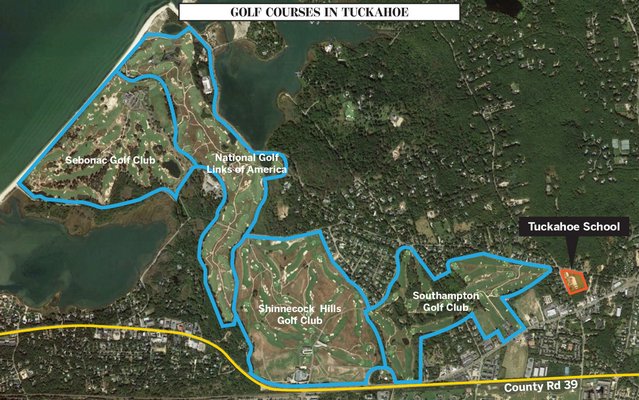
State lawmakers are preparing legislation that aims to change how golf courses statewide are taxed, including in Southampton Town, and especially in Tuckahoe, potentially lessening the financial burden on residential taxpayers.
Tuckahoe School District officials have, for years, argued that four private golf clubs in the district—National Golf Links of America, Southampton Golf Club, Shinnecock Hills Golf Club and Sebonac Golf Club—have paid less than their fair share of taxes to the district.
The golf courses are assessed on their annual income, similar to the way other commercial properties are taxed, and pay only about a third of the taxes they would if assessed on their overall property value.
The courses cover a total of 951 acres, which is 12.7 percent of the entire district, yet they pay less than 5 percent of the district’s total tax levy.
In addition to excluding the high value of the land they occupy, when the golf courses are assessed on commercial activities, income from the restaurants and pro shop sales are considered but not annual membership dues, according to Lisa Goree, the sole receiver at the Town of Southampton.
A bill in the State Assembly co-sponsored by Assemblyman Fred W. Thiele Jr. of Sag Harbor would give local municipalities the choice of assessing golf courses by either their highest and best use—in this case, considering the land value—or income.
“The choice would be the town’s,” Mr. Thiele said in an email on Tuesday. “Under current law, they have to use the current value/income method. Generally speaking, the assessment based on current value is much lower than highest and best use.
“Tuckahoe, with four golf courses, sees lower taxes for golf courses and higher taxes for homeowners based on current use/income method,” he added.
Mr. Thiele said if the bill gets through and the town chooses to tax the golf courses on their land value, the golf courses would pay more—and the residents in the school district would pay less in property taxes.
In August 2018, State Supreme Court Justice Paul J. Baisley Jr. denied a Tuckahoe School District request to reconsider a 2014 denial of a Freedom of Information Law request to view the financial records of the golf courses.
The district had submitted a series of FOIL requests to the town to see the records, so officials could determine the amount of taxes owed by the courses, but they were all turned down. Town Attorney Jim Burke has said the requests were denied because disclosing the records would expose competitive secrets.
In his decision, Justice Baisley said the town had a reasonable basis for withholding the records.
On Tuesday, Tuckahoe School Superintendent Leonard Skuggevik said in an email that the taxing of the golf courses would not benefit the school—it wouldn’t bring in more tax revenue—but would, instead, benefit other residents.
“As we understand the bill, the Tuckahoe taxpayers would receive a financial benefit if the bill is passed and the Town of Southampton decided to implement it,” he said. “The bill appears to create the possibility for the total assessed value for the Tuckahoe Common School District to be increased, thus reducing the tax rate for a homeowner.
“If a higher rate of tax was implemented on the golf courses, the burden of the homeowner as a taxpayer would be lessened, as they would be responsible for a smaller piece of the whole pie,” Mr. Skuggevik added.
Ms. Goree said on Tuesday that she was interested to see what happens with the bill.
If the properties are assessed on the highest and best use, she said, it would be whatever the rate is for residential vacant land.
“The assessments will probably be lower, because they are assessed as commercial property instead of the highest and best use,” Ms. Goree added. “You have to be careful what you wish for sometimes. It could be a good thing, it could be a bad thing. It’s too far ahead.”
She said the subject is “very touchy,” but she was sure that state legislators would look at it carefully.
The courses were not always assessed based on income
Mr. Thiele said the shift occurred 25 years ago when a court case in Nassau County resulted in the change in assessment practices that reduced assessments for all golf courses in the state.